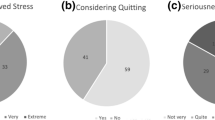Abstract
The American Psychological Association’s (APA) 2014 injunction that supervisors must listen to recorded sessions of their supervisees’ work is based on a rich and thorough body of research, and yet it entails a narrative of psychotherapy as a discipline of Science. If psychotherapy is understood as an endeavor also of the Humanities, recording sessions may be anathematic to supervision and training. Developing ideas from Greenberg’s (2015) theory of “controlling fiction,” the writer presents a narrative of psychotherapy in which it is not wise to review recorded sessions in supervision.
Similar content being viewed by others
REFERENCES
Adorno, T. (1951). Minima moralia: Reflections from damaged life. London: Verso. 2005.
American Psychological Association. (2014). Guidelines for clinical supervision in health service psychology. http://apa.org/about/policy/guidelines-supervision.pdf.
Barnett, J. E. (2009, December). Ask the ethicist: The role of recording in psychotherapy (Web article). https://www.societyforpsychotherapy.org/ask-the-ethicist-the-role-of-recording-in-psychotherapy.
De La Parra, G. & Del Rio, M. (2005). Can psychoanalysis and systematic research work productively together? International Journal of Psycho-Analysis, 86(1), 151–154.
Deleuze, G. (1986). Cinema 1: The movement image (trans: (H. Tomlinson and B. Habberjam, Trans.). London: Continuum. 2001.
Feaver, W. (1992). Lucian Freud and William Feaver: Conversation. In Lucian Freud. New York: Rizzoli International. 2011.
Foucault, M. (1975). Discipline and punish: The birth of a prison. (A. Sheridan, Trans.). New York: Vintage. 1995.
Freud, S. (1917). Introductory lectures on psycho-analysis. Part 3. Standard Edition Vol. 16, (pp. 241–463). London: Hogarth.
Greenberg, J. (2015). Therapeutic action and the analyst’s responsibility. Journal of the American Psychoanalytic Association, 63(1), 15–32.
Grosz, S. (2013). The examined life. How we lose and find ourselves. New York: W.W. Norton & Co.
Haggerty, G. & Hilsenroth, M. J. (2011). The use of video in psychotherapy supervision. British Journal of Psychotherapy, 27(2), 193–210.
Kafka, F. (1909). Description of a struggle. In N. N. Glatzer (Ed.), The complete short stories of Franz Kafka New York: Schocken Books. 1971.
Kafka, F. (1926). The castle (M. Harman, trans.). New York: Schocken Books, 1998.
Kernberg, O. (2019). Reflections on supervision. American Journal of Psychoanalysis, 79(3), 265–283.
Lacan, J. (1975). Encore: The seminar, Book X. 1972–1973. J. A. Miller (Ed.). Paris: Seuil.
Mitchell, S. A. & Aron, L. (1999). Relational psychoanalysis: The emergence of a tradition. Hillsdale, NJ: The Analytic Press.
Pascal, B. (1669). Mind on fire: A faith for the skeptical and indifferent. A. Houston (Ed.). Vancouver, CA: Regent College Publishing. 1989.
Peddler, J. (1986). Reflections on the theory and practice of supervision. Psychoanalytic Psychotherapy, 2(1), 1–12.
Quinodoz, J.-M. (1994). Clinical facts or psychoanalytic clinical facts. International Journal of Psychoanalysis, 75, 963–976.
Robertson, B. M., Banon, E., Csank, P. R., & Frank, D. E. (2004). Analysts involved in research: Preliminary observations and hopeful signs. Canadian Journal of Psychoanalysis, 12(2), 195–216.
Roiphe, J. (1995). The conceptualisation and communication of clinical facts: A consideration of the 75th anniversary edition. International Journal of Psycho-Analysis, 76, 1179–1190.
Rowell, M. (1973). Jean Dubuffet: An art on the margins of culture. In Jean Dubuffet: A retrospective. New York: The Solomon R. Guggenheim Foundation.
Sass, L. A. (1992). Madness and modernism: Insanity in the light of modern art, literature, and thought Boston: Harvard University Press. 1994.
Shelley, P. B. (1840). A defense of poetry Boston: Ginn & Company. 1891.
Symington, N. (1996). The making of a psychotherapist. Madison, CT: International Universities Press.
Town, J. M., Diener, M. J., Abbass, A., Leichsenring, F., Driessen, E., & Rabung, S. (2012). A meta-analysis of psychodynamic psychotherapy outcomes: Evaluating the effects of research-specific procedures. Psychotherapy: Theory, Research and Practice, 49(3), 276–290.
Tuckett, D. (1994). The conceptualisation and communication of clinical facts in psychoanalysis—Foreword. International Journal of Psychoanalysis, 75, 865–870.
Videotaping therapy (Web article). Retrieved August 15, 2019, from https://www.dpfortherapists.com/videotaping-therapy.
Virgil. (29 bce). The Georgics, II: 458, p. 67. 2009.
Zicht, S. R. (2013). On the experiential and psychotherapeutic dimensions of psychoanalytic supervision: An interpersonal perspective. American Journal of Psychoanalysis, 73(1), 8–29.
Žižek, S. (2006). The parallax view. Boston: MIT Press.
Author information
Authors and Affiliations
Corresponding author
Additional information
Publisher's Note
Springer Nature remains neutral with regard to jurisdictional claims in published maps and institutional affiliations.
Rights and permissions
About this article
Cite this article
Detrixhe, J.J. AGAINST RECORDING SESSIONS FOR SUPERVISION. Am J Psychoanal 81, 511–526 (2021). https://doi.org/10.1057/s11231-021-09330-x
Published:
Issue Date:
DOI: https://doi.org/10.1057/s11231-021-09330-x




